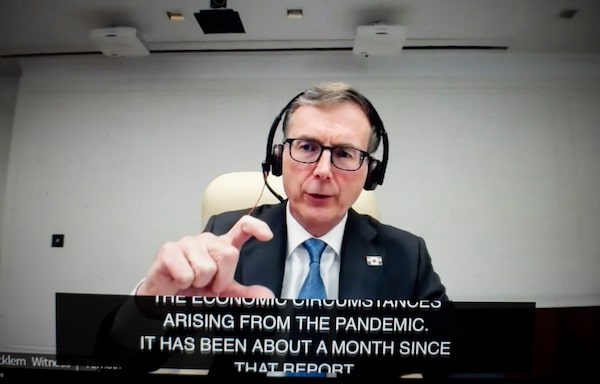
Tiff Macklem, seen here on June 16, 2020, suggested that the bank’s forthcoming quarterly Monetary Policy Report will lay the groundwork for the next policy steps, as the bank begins to position for the recovery.Fred Lum
After unleashing a barrage of measures early in the COVID-19 crisis to successfully stabilize financial markets and keep credit flowing, the Bank of Canada is about to pivot to bolstering the burgeoning economic recovery, new governor Tiff Macklem said Tuesday.
“The focus in the initial months of the crisis was very much on restoring orderly market conditions, and we are pleased to see that market conditions are normalizing. And so with that, we are turning our focus more to monetary policy,” Mr. Macklem told a video-conference session of the House of Commons standing committee on finance.
“With market functioning improved and containment restrictions easing, the bank’s focus will shift to supporting the resumption of growth in output and employment.”
The committee appearance marked Mr. Macklem’s first public comments since he took over as the Governor on June 3. After less than two weeks on the job, Mr. Macklem’s comments deviated little from the bank’s public position under his predecessor, Stephen Poloz, whose seven-year term as governor expired earlier this month.
In the final three months of Mr. Poloz’s tenure, the bank took aggressive actions against the COVID-19 crisis, including slashing interest rates to a record-low 0.25 per cent, and injecting hundreds of billions of dollars into the financial system through a raft of new programs that have more than quadrupled the bank’s balance sheet.
Mr. Macklem suggested that the bank’s forthcoming quarterly Monetary Policy Report (MPR), to be published July 15, will lay the groundwork for the next policy steps, as the bank begins to position for the recovery.
“It will provide us a planning scenario, which will be important for the calibration of monetary policy,” he said. “That’s sort of the next step in the process, to determine how much monetary stimulus will be needed, and help us figure out for how long.”
“What we really want to avoid is a non-recovery,” Mr. Macklem said. “That will create huge problems. That’s why these measures are so important.”
The key to the July MPR will be an update on the bank’s economic forecasts – something it hasn’t fully provided since January. In its last MPR in April, the bank opted not to issue specific growth and inflation projections, citing the highly unpredictable nature of the pandemic and its economic repercussions.
Mr. Macklem indicated that the July outlook might still be less precise in its forecasts than it would be under more normal conditions.
“There’s still a lot of uncertainty, particularly around the evolution of the pandemic,” he said. “I imagine [the outlook] is going to be more of a ‘scenario,’ possibly with some risk scenarios around that.”
He reaffirmed the bank’s position that it considers the current level of its key interest rate, at 0.25 per cent, to be the effective bottom – reinforcing the message that the bank isn’t considering cutting rates into negative territory. He also indicated he doesn’t see rate increases on the horizon – despite concerns expressed by some members of the finance committee that the bank’s low rates and ballooning balance sheet could fuel inflation and exacerbate already-high household debt.
“We’re focused on providing the monetary stimulus and delivering low interest rates to support the recovery," Mr. Macklem said.
“The biggest risk to Canadians becoming insolvent is not having a job,” he said. “Monetary policy has lowered interest rates to reduce the interest costs that Canadians are facing. That is the best contribution we can make to getting Canadians back to work, which is the best thing we can do to prevent Canadians from going insolvent."
“Someday, we will get through this, the economy will be recovered, and interest rates will start to move back to more normal levels. But we’re in a deep hole. And it’s going to be a long way out of this hole.”
Canadians will hear more from Mr. Macklem next Monday, when he gives his first speech as Governor, a video-conference address to an Ottawa business audience. He’ll follow the speech with his first news conference.
“He will be subject to a line of media questioning that will be more market-relevant than today, and should uncover more clarity on his policy stance relative to the outgoing governor,” National Bank of Canada economists Taylor Schleich and Jocelyn Paquet said in a research note.
Your time is valuable. Have the Top Business Headlines newsletter conveniently delivered to your inbox in the morning or evening. Sign up today.